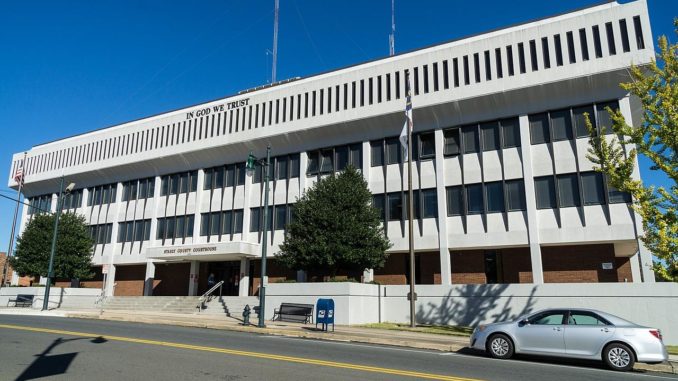
ALBEMARLE — For almost a year, the bulk of cases, both criminal and civil, at the Stanly County Courthouse have been postponed, leading to worries of criminal activity going unpunished and of backlogs that will be difficult to dig out from.
On March 17, 2020, an administrative order was signed by Judicial District 20a’s senior resident Superior Court judge, Kevin Bridges, and its chief District Court judge, John Nance, that eliminated much of the business at the Stanly County Courthouse. District 20a serves Stanly and Montgomery counties and has an overlapping District Court and Superior Court which deal with both civil and criminal laws in the area.
This administrative order was then repeatedly extended for 30-day periods, then on Jan. 17, 2021, the order was again extended, but until March 1, 2021.
The order, written to address “concerns raised by the catastrophic conditions which exist throughout North Carolina caused by the spread of the novel coronavirus (COVID-19),” reduces and delays large areas of court business or orders them to be done remotely.
In Section 4 of the order, where the District Court’s business is delineated, virtually all criminal cases were “continued,” a legal term meaning postponed to a future date, unless the defendant is already in custody.
In Section 5 of the order, a similar policy was taken for the criminal cases assigned to the Superior Court, saying, “Criminal Superior Court shall not have a calendar call. All cases with defendants not in custody shall be continued [postponed].” Regarding civil cases, the order simply said, “Civil Superior hearings and trials are continued beyond 30 days until further notice.”
“We’re going to be so damn far behind it ain’t even going to be funny,” local bail bondsman Phil Burr told SCJ on Jan. 29. “The chief justice gave the judges the discretion to do what they thought was right. The neighboring counties are running wide open, superior and district courts. We’re shut down here until March 1 — and it may be later than that.”
Burr said he has multiple examples in his files of serious criminal defendants who had their cases dismissed or were given unsecured bonds in order to keep them out of the prisons.
“Any misdemeanors and even certain classes of felonies, they’re turning them loose,” Burr said.
The Facebook page Stanly County Jail Releases, which has about 1,400 followers, tracks these releases. There are multiple examples there of people being arrested for felonies who are then given unsecured bonds, meaning they do not have to put up any money or collateral for their release but instead promise to return later for their court dates. Many of them do not return, or, with most criminal cases being postponed at the moment, there is no trial to return to in the foreseeable future.
But Stanly County Sheriff Jeff Crisco said he isn’t sure the current court policies are leading to re-offense by people who would otherwise be locked up.
“I would hate to say yes when I haven’t looked at any jail logs to see,” Crisco told SCJ. “I can tell you this; the jail — the Stanly County Detention Center — has a maximum capacity of 131. As of this morning, I have 144. So, our numbers are actually starting to increase as far as the bodies that we have in the detention center.”
Crisco said the county jail did have a period “where we had a backlog of people that needed to go to prison, and we were just holding them waiting on bed space to come available [in state prisons].” This crowding was relieved when the prisons began taking these prisoners, but the numbers are again rising, maybe signaling a reluctance for the state to accept prisoners from counties.
The National Commission on COVID-19 and Criminal Justice, a think tank focusing on how jail populations are affected by the coronavirus, found that jail bookings in the United States have fallen by 36% compared with before the epidemic. They also found that the people who are being sent to jail are being “booked on more charges on average, were more likely to be booked on felony charges, and were less likely to be booked on lesser charges like failure to appear, than those booked into jails prior to this period.”
This trend of local judges largely reserving jail time to serious offenses is due to pressure to keep these numbers down because of the risk of an outbreak among the captive population.
President Trump’s attorney general, Bill Barr, put out a directive in April asking judges to bear this danger in mind during sentencing, saying, “Even with the extensive precautions we are currently taking, each time a new person is added to a jail, it presents at least some risk to the personnel who operate that facility and to the people incarcerated therein.”
Other N.C. courts are making similar decisions, even overturning prior convictions to make space or to lighten their caseload. Two men, Shawn Birchfield-Finn and Raul Jimenez, who were convicted in the 2018 toppling of a Confederate statue on the campus of the University of North Carolina at Chapel Hill had their convictions dismissed on Jan. 27 after an appeal. The Associated Press said the prosecutor made the decision “based on having to prioritize cases piling up in the Orange County court since it was shut down by the pandemic.”
